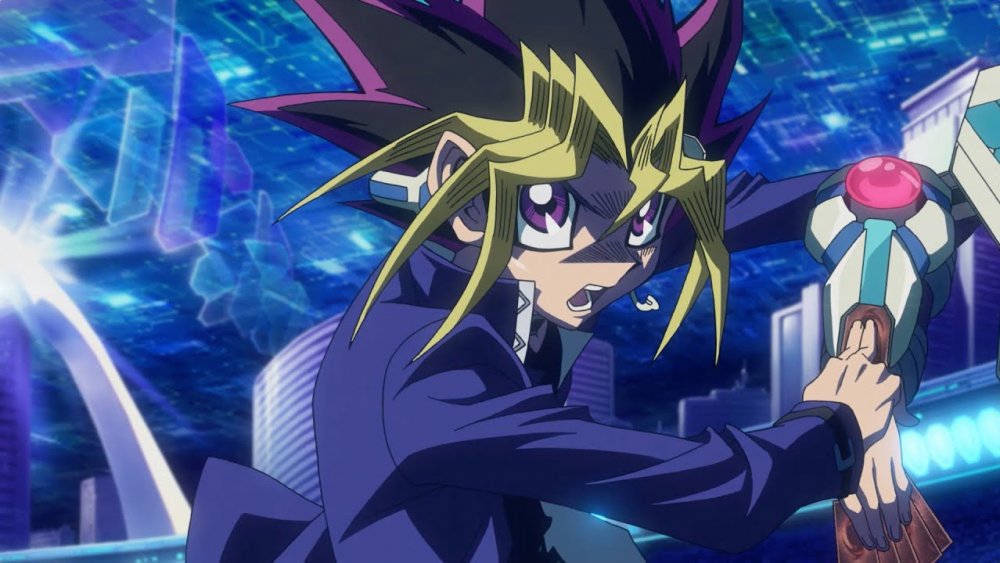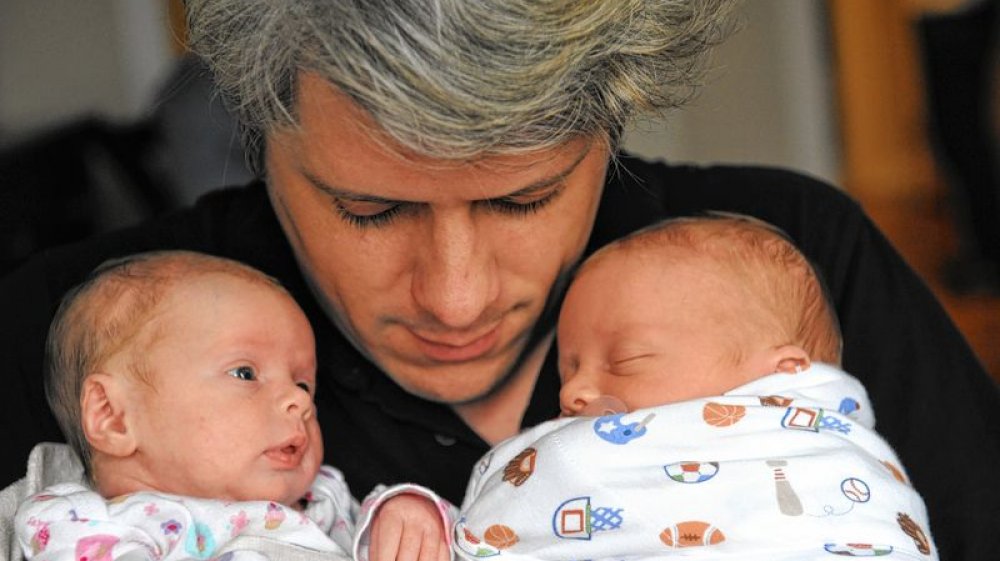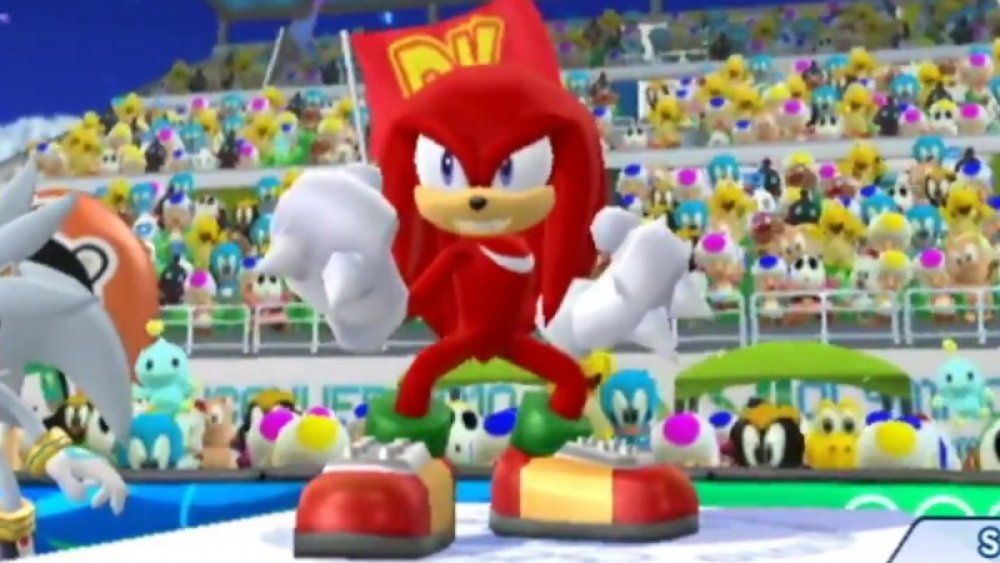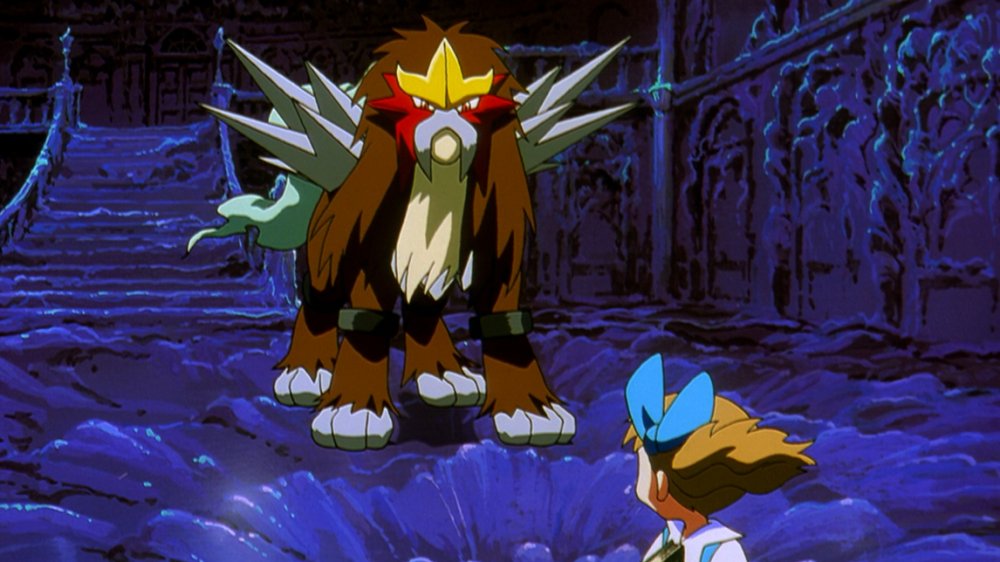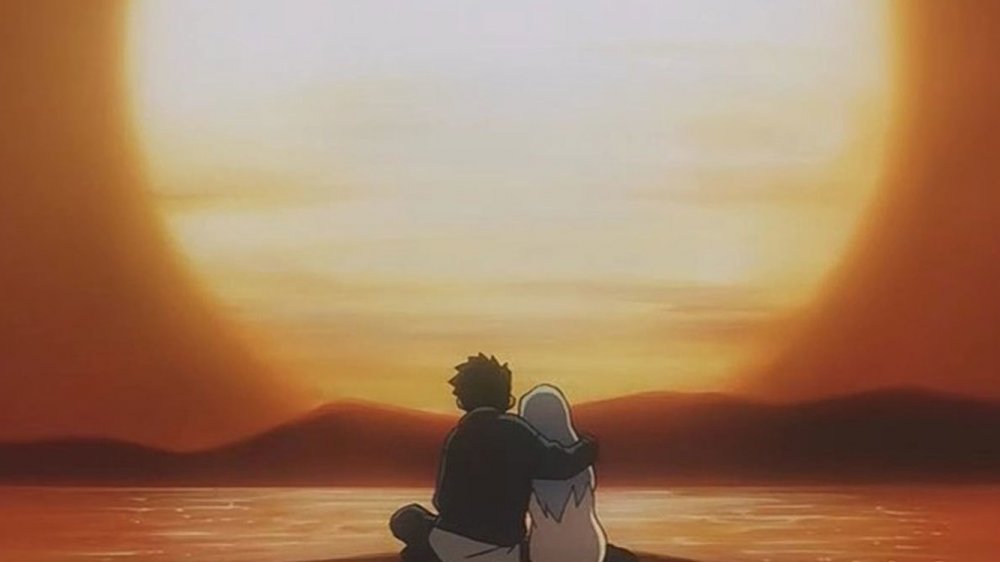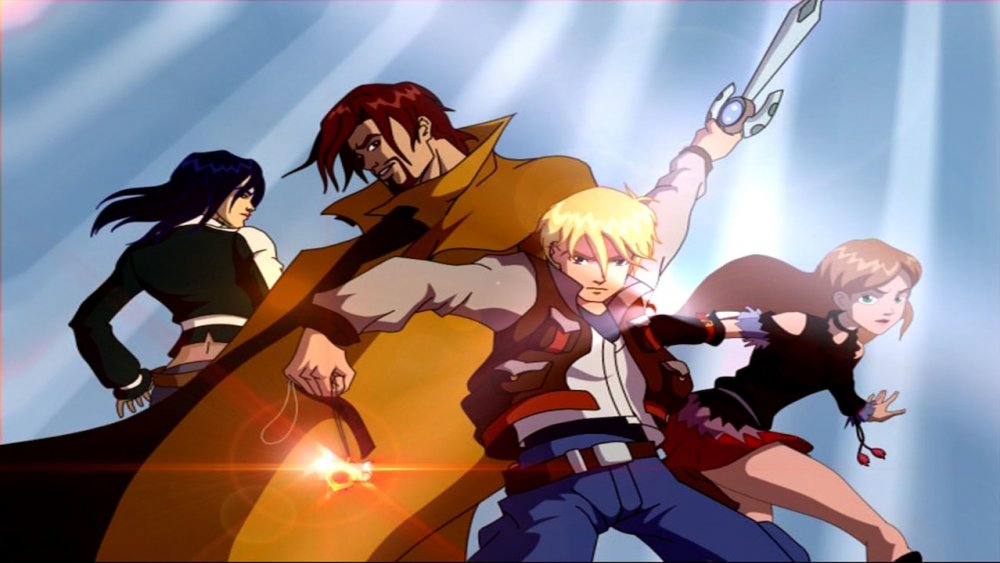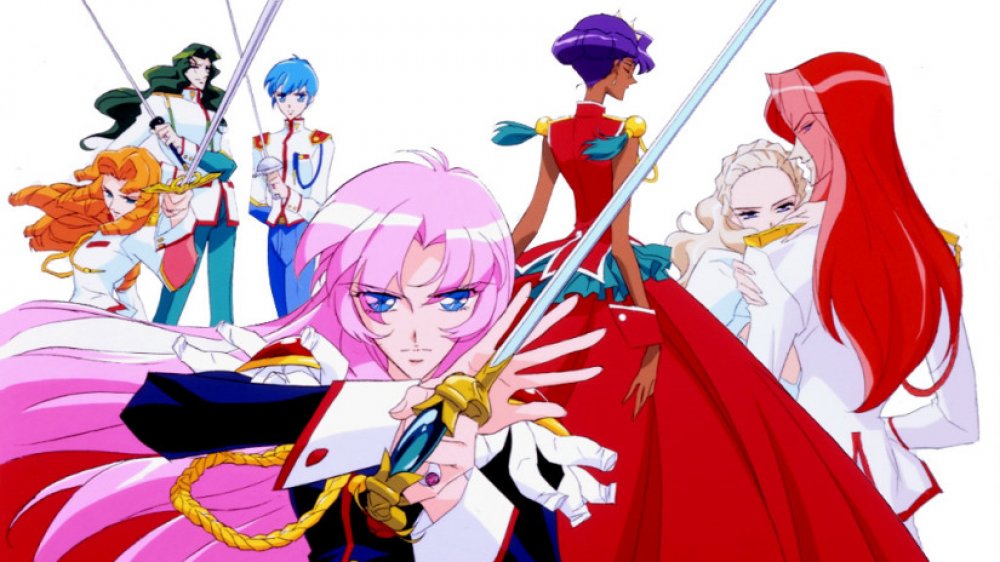The Truth Behind The Voice Of Yu-Gi-Oh!'s Yugi Moto
In the western world, voice acting for anime has grown to enjoy a niche kind of celebrity only in the past decade or so, but Dan Green has been in the business of localizing anime since the 1990s. It wasn't until the mid-2000s, however, that he would claim the role that has defined his career: Yugi Moto (and, of course, the Egyptian pharaoh that possesses him, Yami Yugi), the main character of the hit manga-turned-anime Yu-Gi-Oh! The Movie: Pyramid of Light. If you weren't of a very precise age bracket when the film premiered in 2004, it's difficult to articulate just how huge Yu-Gi-Oh! — both the anime and the card game that became popular because of it — were at that time. To put it simply: a gentle, underhanded toss of a rock back then would have bounced off at least one 10-to-14-year-old kid yearning for a Blue Eyes White Dragon card.
Green has portrayed the young man with impossibly star-shaped, multicolored hair that has flustered many a cosplayer for 15 years, as well as several smaller roles in the latter-day Yu-Gi-Oh! adaptations in which Yugi doesn't appear. His most recent turn as Yugi Moto was in 2016 for the third theatrical-release film Yu-Gi-Oh!: The Dark Side of Dimensions.
Yugi Moto will always be important to Green and his legacy, but it may surprise you to know that it isn't his ultimate favorite role. He has dozens of voice credits spanning nearly 30 years — most are for anime, but a number are for western productions from several countries — and has lived quite a life outside the recording booth. Let's dig into the nitty-gritty of this storied career and reveal the truth behind the voice of Yu-Gi-Oh!'s Yugi Moto.
Dan Green's complicated name recognition
Dan Green's actual name is James Snyder, and some of his voice acting credits appear as "Jay Snyder" instead of his colorful pseudonym. This is due to the complex nature of the animation industry offering both union and non-union roles. Most voice actors are members of the Screen Actors' Guild — just like all the household-name celebs you're used to seeing at the big awards ceremony — but anime productions (and western animation projects as well) don't command the budgets of American live-action television and film, so in order to save money, not every role comes at higher union pay rates.
As a result, you'll often find many anime voice actors go by numerous pseudonyms in order to avoid contract conflicts of interest presented by their participation in the union, which requires as part of certain echelons of membership to never take non-union roles. Green even attends conventions in official capacity under his pseudonym, since that is his credited name in Yu-Gi-Oh!, his most famous role.
In addition to voicing Yu-Gi-Oh!'s Yugi Moto, Dan Green was the original Knuckles
Voice work is, most often, a one-and-done gig. Were you to ask them, many voice actors wouldn't be able to tell you much about the character they play, and may not even be able to tell you what they look like, no matter how iconic the anime or video game becomes. It's even rarer for an actor to be famous enough to take interviews about a particular role. In Dan Green's case, he's attained a rarified air in his career as a recognizable face for two characters with a high enough profile that even your normcore mom just might recognize them by sight. There's Yugi Moto, of course, but Green was also the original voice actor for Knuckles the Echidna of SEGA fame.
For 5 years, Green lent his voice first to the Sonic the Hedgehog anime series Sonic X, and because of that, he was brought in along with the rest of that voice cast to work for every iteration of the video game franchise until 2010, when all the major Sonic character roles were re-cast and Travis Willingham (of Critical Role fame) replaced him as the character.
Dan Green's gotta voice 'em all
Dan Green has also done extensive work for the Pokémon franchise dating back to 1999. His biggest role most people would recognize is from Pokemon 3: The Movie – Spell of the Unown, as the professor-turned-legendary Pokémon, Entei. Green has described his work on the film as one of the favorites of his entire career, partially because it was a big break for him: "When I did the character of Entei from the third Pokémon movie, that was exciting because it was a movie, it was actually in theaters, and I'd never had that experience before, but also the character itself has a really interesting role to play in what I thought was a really interesting story."
Beyond that standout performance, Green portrayed a couple dozen roles as both humans and Pokémon until abruptly going on hiatus in late 2011, when his wife unexpectedly died in childbirth. His entire career has dropped off in volume since that tragedy, no doubt due to both the grief and the time raising twins demands of a single parent. Post-2011, Green returned only once to any further Pokémon work in a brief turn on the XY series in 2014.
Dan Green's deep cuts
The pipeline of content from Japan has expanded exponentially over the past 20 years, but even as far back as the '90s, there were titles making their way overseas that even people deep into anime have hardly heard of. Here are a couple of selections from Green's filmography that are off the beaten path.
Osamu Tezuka, the creator of the manga classics Astroboy and Princess Knight, also worked on a lifelong project entitled Phoenix, which unfortunately was never finished due to his death in 1989. The series is split into episodic chapters spread across time (some are actual historical periods, others are far-future sci-fi stories), but are all united by tales of unrequited desires for immortality by hunting the mythical phoenix. Phoenix has received multiple anime adaptations, and Green is a main character in a 2004 adaptation and localization of the first arc, Dawn. In it, he portrays Guzuri, a doctor who arrives in a small village with ulterior motives on behalf of the queen, who is seeking immortality.
Now and Then, Here and There is another series from the late '90s and might be one of the best you've never heard of. With just one season and 13 episodes, this dark, apocalyptic meditation on human nature might feel like a body blow to watch, but it's highly celebrated by those who have taken the time to hunt it down. It follows Shuu Matsutani, a young boy accidentally transported through time while defending a mysterious girl named Lala-Ru with a magic, water-creating talisman to an Earth living in the shadow of a red dwarf sun, where the landscape is almost entirely obliterated. Recruited into a cadre of child soldiers against his will, Shuu must fight to survive in this world on the edge, save Lala-Ru, and return home where he belongs. Green plays Nabuca, one of the future-era children in the platoon.
Dan Green's other global work
While it can feel like all animated productions come from either Japan or America, that's of course far from the truth. The popular children's series Winx Club that aired on the Disney Channel, for example, was produced in Italy, and yes, Green was on it as the character Sky. That same studio, run by Italian animator Iginio Straffi, also produced a short-lived series from 2009 entitled Huntik: Seekers and Secrets – a magical-realism adventure story that's something like The Librarians as a children's cartoon. On it, Green plays the character Montahue, the best friend of principal character Dante. Both are Seekers, people with a magical gift that allows them to perform spells and summon creatures called Titans from the titular spirit world of Huntik. Huntik: Seekers and Secrets was cut short after just two seasons (as is the fate of many animated series), but is available on Netflix.
This submission might feel a little strange to include since it's a show aimed at pre-school and elementary-age children, but it has its own surprising importance. KikOriki — originally entitled Smeshariki in its native Russia — is a children's series featuring stylized animals experiencing the typical moral journeys you would expect of most programs like it. At its heart is the blue rabbit Krosh, whom Green voices as part of the English localization of the original series (he doesn't reprise the role for the feature-length films). You may not have heard of it, but this is an incredibly popular cartoon where it comes from; the series' official YouTube account has over 2 million subscribers and many more millions of hits. It's such a big deal, Russian and Chinese governments formed a trade deal involving it. That's one heck of a culturally important orb-rabbit.
What Dan Green has done away from the mic
With the American anime scene being as niche as it is, many of the personalities involved with the dubbing process also grow into other roles as part of localization production. Since many have backgrounds in related technical or artistic skills (Green has a BFA in acting from Rutgers University, for example), their abilities are a big boon for the less glitzy parts of the job, like voice direction or adapting teleplays from their original Japanese. The process of script adaptation is a delicate one in anime — basic transliteration of words does not a good screenplay make. "Adaptation" for something like anime requires maintaining a certain spirit or attitude that the strict linguistic difference between English and Japanese cannot appropriately meet. Green has done both, though he has far more credits for script adaptation. He assisted in the task for Revolutionary Girl Utena, Mobile Suit Gundam: Unicorn, and the sexually suggestive fan-service bonanza that is Queen's Blade. Green also was the automated dialogue replacement (ADR) director for Huntik: Seekers and Secrets.
You may recognize Green's voice as the titular Kyo in the classic Samurai Deeper Kyo, too. What you may not know, however, is that he not only performed script adaptation for it, but was also the overall director for the entire series. Juggling three important technical hats is an impressive enough task, but when you recall that Kyo's character incorporates two very different people occupying one body, that must be recognized as a major career achievement to be exceptionally proud of.
